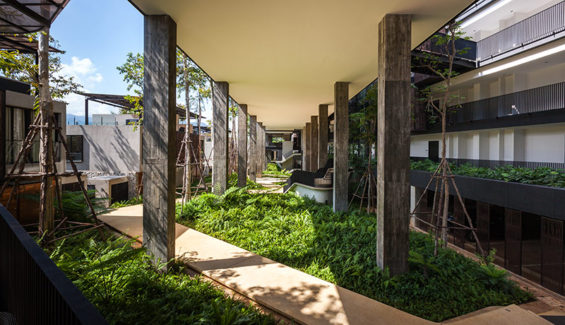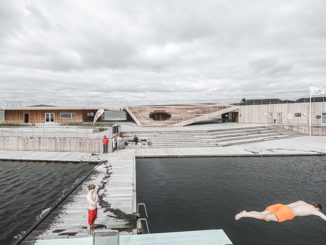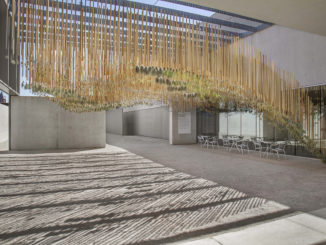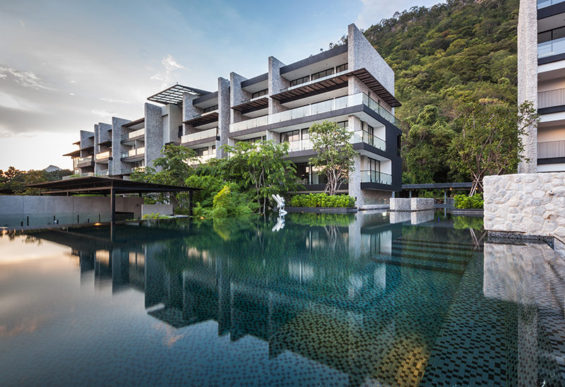
Inspired by the nearby mountain range, Khao Yai, Thailand’s largest rain forest (also Thailand’s first national park), the landscape is created as the link between the architecture and Nature. Instead of trying to produce a faked natural forest, the architecture is interpreted as big trees while the landscape represents the green areas underneath. Working with different qualities of sunlight, the landscape solution successfully introduces the man-made sustainable forest, which inspires the residents to understand and appreciate what Nature is all about.
Botanica Khao Yai is located on the edge of Khao Yai, the most important national reserve forested region of Thailand. The site was an abandoned agricultural land. On the front, it faces a local road, and, on the back, a small mountain just right next to the boundary line. Separated into 2 main plots, the front plot, next to the road, is the residential area, while the second plot, next to the mountain, is reserved as a public park for recreational activities of the residents and visitors.
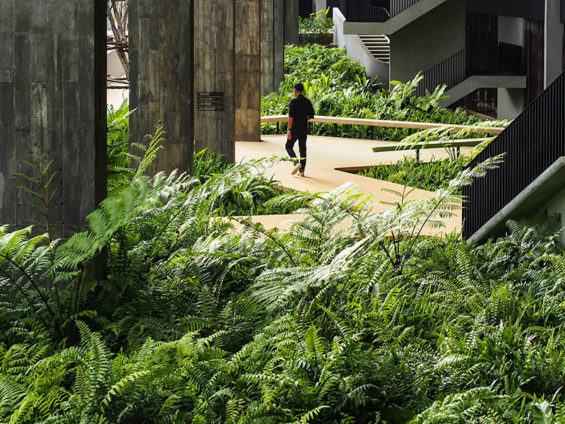
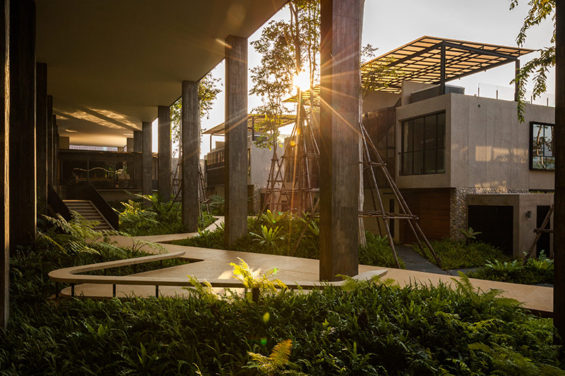
In order to fit all unit requirements into a compact area, ‘The Residences’, a series of residential blocks, were arranged on the landscape platform. Two 6-storey buildings, called Block A and Block B, are located along the edge between 2 land plots. Block B is a simple 6-storey residential block, while Block A is a bit more complicated. It has a V Shape layout. One part of the block has units for all 6 floors, facing the mountain behind. The other part is located in the middle of the first plot, elevated 4 floors from the ground with units only on the top 2 floors, facing the front of the property. The elevated units are built on gigantic concrete columns, leaving space underneath as big opening void. Along the road, 12 2-storey villas are created, with private gardens and pools.
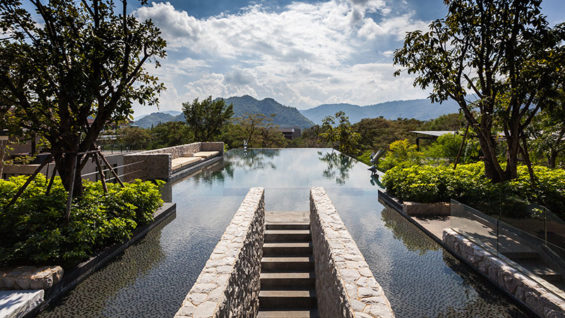
Despite the architecture’s modern and geometrical design, we saw a similar atmosphere found in Khao Yai. Because each building has different height, some units elevated on tall columns, a different variety of sunlight qualities are created throughout the project. Sunlight availabilities became the main criteria that we used to re-create a forest-like landscape here. The floating units on tall columns reminded us of gigantic trees in the forest. Each column is about the same size as the trunks of those trees, and the units above reminded us of the canopies. The area underneath is very similar to conditions we found under the trees, which, despite of its lack of sunlight, Nature has found its way to thrive under this hard condition in order to survive. Imitating this natural condition, Topographic green landforms were created in the shaded area. Local Ferns, found in the forest, were used to cover up the landform, called the Fern Hills.
The main pedestrian circulation of the area is called ‘The Path’. Raised a bit above the Fern Hills, it serpentines left and right, up and down throughout the landscape, enabling residents to choose their own routes amidst natural surroundings to their accommodations. More than being just a movement artery, the Path is also a recreational area, where residents could exercise or take a leisure walk and experience direct contact with Nature. The Path is also linked to the public areas such as lobby, clubhouse, lift hall and corridors, all designed as open-air without using air condition, instead creating a cool and shady environment with large trees. Natural lighting is also integrated into the entire project. Local materials were selected to harmonize the architecture and the landscape. These materials can easily be acquired locally such as mountain stones, found at the site during basement construction.
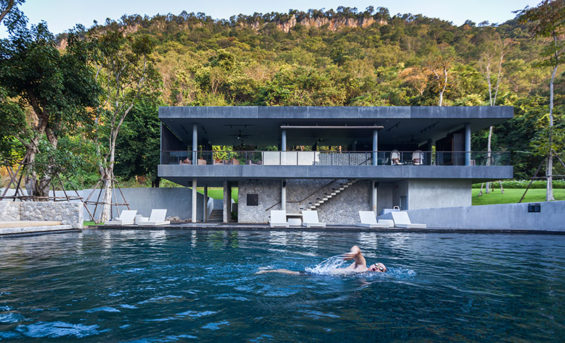
On the second land plot, ‘The Park’ was created as the recreational attraction for all residents and visitors. With the neighboring mountain, right next to the boundary, 3 layers of sub-drainage systems were carefully prepared to prevent flood and land slide. Excessive rainwater is harvested and collected for irrigational uses during the dry season. A variety of landscape programs have been introduced to the property. The Dining Pavilion, hidden by bamboo forest, was designed to frame the boundary of the Park. At the base of the mountain, a green hill was integrated into a reflecting pond, demonstrating some contrast between Manmade and Natural landscape. Yet, with the reflection of the mountain, it unites both together seamlessly. 2 swimming pools were also proposed. The first pool was located on top of a gym and a lounge. Its reflective water camouflages the massive structure underneath, making it totally disappeared. The second pool was created in the middle of the Park. Its water also reflects the surroundings, both the mountain and the architecture, combining all together as part of the overall landscape. Encouraging the good health is one of our main objectives designing the residential landscape. A Jogging Track is also proposed on the right side of the Park. Trying to achieve the maximum length of the running track, an elevated jogging bridge is introduced as a tool to multiply the routing options for the runners. Its shape also echoes the mountainous skyline of the surrounding areas. Overall the design team has developed designs within a contemporary context, but still keeping intact the essence of a tropical feeling and atmosphere. This is achieved through a careful consideration of appropriate layout to ensure that the residents are able to see the beautiful panoramic-scape of Khao Yai. We believe that contemporary design does not have to be in opposition to nature. The intention for the concept is to create the friendly Forest in order to reduce the harshness of man-made structural form, thus, integrating the building and surrounding nature as one.
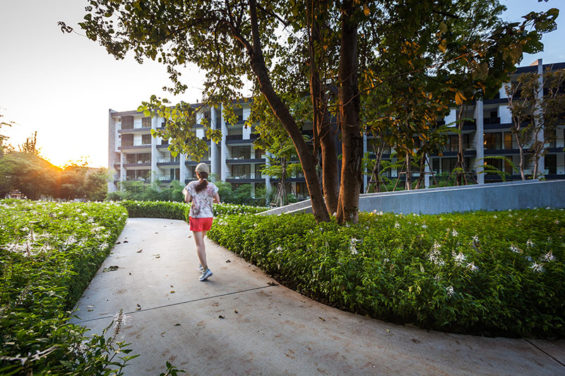
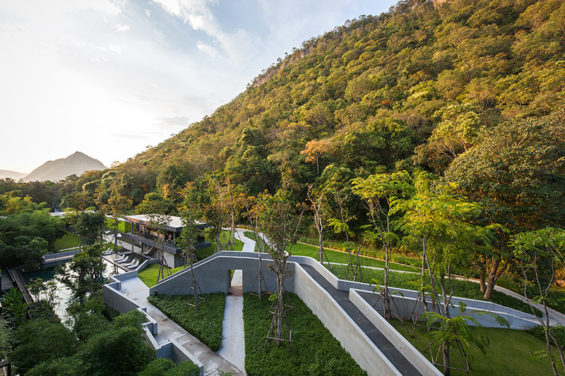
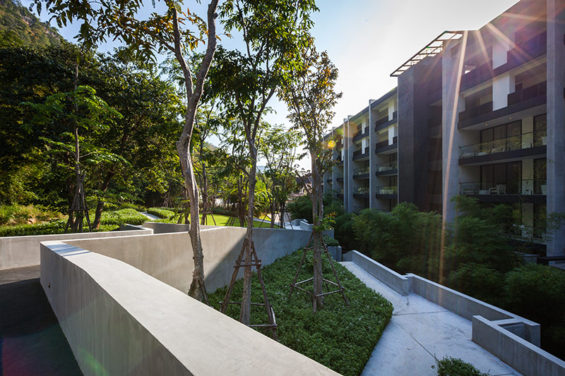
Botanica Khao Yai | Nakhon Ratchasima, Thailand
Design Firm | T.R.O.P | terrains + open space – Bangkok, Thailand
Lead Designer | Pok Kobkongsanti
Client/Owner | The Scenical Development Company Limited
Photography credit | Pirak Anurakyawachon, Aranyarat Prathomrat
Additional Project Credits |
Project Resources
Project Team | Peerasit Sangwanloy
Chanchai Wimonsirichotikun
Architect | Vin Varavarn Architects Co., Ltd.
Interior Designer | Define Studio Co., Ltd.
Mada Design Factory Co., Ltd.
Structural Engineer | Qbic Engineering and Architect Co., Ltd.
M&E Engineer | Thanavit Design & Engineering Co., Ltd.
Water Thai Tech Co., Ltd.
Contractor | Grand Frame Co., Ltd.
Landscape Contractor | Invention Green Co., Ltd.
Interior Contractor | S-PRO Co., Ltd
Central Home Co., Ltd.
Lighting Designer | Truelight Co., Ltd.
Supplier
Sculpture | Cobra Foam Holding Co., Ltd.
Concrete Waterproofing | TPI Polene Co., Ltd.
Wood Decking | Siamcitycement Co., Ltd.
Wood Coating | Beger Co., Ltd.

